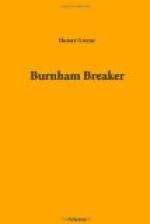CHAPTER I.
A surprise in the screen-room.
The city of Scranton lies in the centre of the Lackawanna coal-field, in the State of Pennsylvania. Year by year the suburbs of the city creep up the sides of the surrounding hills, like the waters of a rising lake.
Standing at any point on this shore line of human habitations, you can look out across the wide landscape and count a score of coal-breakers within the limits of your first glance. These breakers are huge, dark buildings that remind you of castles of the olden time. They are many-winged and many-windowed, and their shaft-towers rise high up toward the clouds and the stars. About the feet of those in the valley the waves of the out-reaching city beat and break, and out on the hill-sides they stand like mighty fortresses built to guard the lives and fortunes of the multitudes who toil beneath them. But they are not long-lived. Like human beings, they rise, they flourish, they die and are forgotten. Not one in hundreds of the people who walk the streets of Scranton to-day, or who dig the coal from its surrounding hills, can tell you where Burnham Breaker stood a quarter of a century ago. Yet there are men still living, and boys who have grown to manhood, scores of them, who toiled for years in the black dust breathed out from its throats of iron, and listened to the thunder of its grinding jaws from dawn to dark of many and many a day.
These will surely tell you where the breaker stood. They are proud to have labored there in other years. They will speak to you of that time with pleasant memories. It was thought to be a stroke of fortune to obtain work at Burnham Breaker. It was just beyond the suburbs of the city as they then were, and near to the homes of all the workmen. The vein of coal at this point was of more than ordinary thickness, and of excellent quality, and these were matters of much moment to the miners who worked there. Then, the wages were always paid according to the highest rate, promptly and in full.
But there was something more, and more important than all this, to be considered. Robert Burnham, the chief power in the company, and the manager of its interests, was a man whose energetic business qualities and methods did not interfere with his concern for the welfare of his employees. He was not only just, but liberal and kind. He held not only the confidence but the good-will, even the affection, of those who labored under him. There were never any strikes at the Burnham mines. The men would have considered it high treason in any one to advocate a strike against the interests of Robert Burnham.




